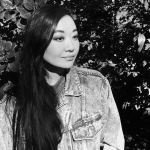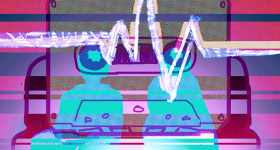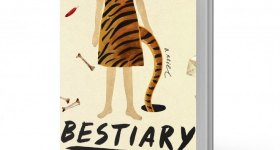I spent several years saving up a large sum of money in hopes of traveling to South Korea to find my birth parents and then lost the money playing baccarat unthinkingly over the course of 3 weeks in July. Later, I’d explain it away as not the right time.
That summer, people swam in Lake Michigan despite toxicity reports. They said, “Just don’t open your mouth or eyes underwater.” They posed in their suits and towels next to water quality signs. They showered when they got itchy and moisturized when their skin flaked off. I didn’t blame them.
I passed a corner bakery every day on my way to work. Through the window I smiled at the baker who ground the heels of his hands into mounds of dough. He seemed worthy of time. I promised myself to go in one day, if only to ask what he was making, to smell the breads and pastries as they cooled on racks. I also told myself I had other places to be. I walked everywhere with purpose, head unturned. I didn’t see my friends as much as I used to, and when I did, we drank too much, and I instinctively slept with my ex-boyfriend who’d divorced a girl whose long legs were splayed across half the American Apparel billboards in Chicago. I wish this last part weren’t true. I was otherwise having a reasonable time of things.
What else happened that summer? A vengeful spouse hired teenagers to throw a Styrofoam cup of battery acid into a woman’s face as the woman rounded the stairs of her L stop. It was all over the news. It happened near my apartment, which felt important.
I wondered: Did the woman, for a few distended seconds, think that the quick burn on her cheeks and down her chest was from the heat of someone’s morning coffee? I wondered: Who was first to see the woman’s face begin to water and pock and pull apart from itself? I wondered: Did the woman, amidst her screams, see her helper’s expression of terror at the sight of her melting body?
A friend, on the phone, said, “Like the end of Robocop.” I was making dinner.
“Out of line!” I shouted and hung up, spatula in the air. The spaghetti stuck together in the pot like a broom. No, I should have hung up, but I didn’t. I’m not sure I’ve ever hung up on someone to prove a point.
I ran into someone I knew. His name was Morgan. I was waiting for the bus and rubbing sunscreen into my forehead without looking.
“Hello you,” said Morgan. He pointed to a spot I’d missed. In college, Morgan was known for telling a story about finding a plastic army man inside a girl’s vagina. He always said, “It practically marched out and onto my hand. I didn’t know what to do, so I saluted.”
I didn’t hate Morgan in adulthood, but he bored me immeasurably. He was blond and laundered and worked on Dearborn. I hadn’t seen him in a while even though we lived in the same city and knew the same people. I dated his roommate a few years back so Morgan didn’t trust me, but likewise thought me fuckable. For this and other reasons, we continued talking, feeling out each other’s intentions on the sidewalk. He asked me about my trip to Korea. He’d heard of my plans from mutual acquaintances, which made me uncomfortable.
“I’m unspeakably excited — I’ve been waiting my whole life for this experience,” I said. I was talking at the ground.
“Transformative,” he said. He was wearing flip-flops with a little green dog pattern on them. He backed up, squinting into the light.
“Spiritual,” I said, trying to tone things down. “I’m nervous and euphoric in equal measure.” I rubbed the sunscreen spot on my forehead.
He asked me, “Have you thought about what you might ask them? Your birth parents, I mean?”
“No, not entirely,” I said. This was true. He forced a look of sympathy from the center of his eyebrows, which disgusted me. “I’ll ask them about their happiness,” I said. “It’s an important question.”
“And maybe they’ll ask the same of you,” he said.
“I’ll tell them about this place,” I said.
He said, “I’ve heard that Seoul is a beautiful city.”
A little later we were certain of our disinterest in each other and sweating from shadeless, windless standing. I saw my bus a few blocks away and he saw me looking at it, wished me good luck in my travels, touched my elbow, and we parted ways, never to see each other again. Actually, I saw him a few years later at a wedding, but he’d grown a beard and moved to Idaho and seemed a different person entirely — he gifted the bride and groom a sourdough starter kit — so in effect, my last time seeing Morgan was our encounter on the street.
What else, exactly? I wasn’t a gambling addict. I thought about trying to win some of the money back but wasn’t sure I could or didn’t want to risk a further loss. Really, this is what happened in July: I nodded to the dealer, looked down at my changing stacks of glossy chips, aired out my armpits, ordered dark ‘n’ stormys, and then one day the money was gone. I remember leaving the baccarat table for the last time, feeling thirsty. I found a water fountain by the bathrooms and stared into the holes of its drain as I drank. I remember thinking about cleaning my apartment, about the sink full of dishes.
My coworker Sam was the only person who knew about my involvement with baccarat. Earlier that summer she came with me to the casino in Bridgeview. We used her car. She often said, “You’ve really done it this time,” which felt right. She was from Milaca, Minnesota. I liked her because she was openly uncertain of me. At first I was surprised that she agreed to Bridgeview at all, but she liked slots, she said, and she didn’t want to go to the casino alone. We both enjoyed skill-less games.
That summer, the city’s sewage systems clogged and coated low-lying streets with thin sheets of liquid filth. I worried about disease in oblique, half-hearted ways. We were told to flush toilets less frequently, and I obeyed unless I forgot. I wondered: Did fewer people have sex that summer, on average? Did fewer people hold hands as they walked the streets, embarrassed by their damp palms? The air was overripe but vegetal and sweet. It smelled the sweetest in the mornings.
In early July on our way to Bridgeview for the first time, Sam asked about my trip to Korea. I was driving her car because she asked me to, and I turned down the radio that I’d tuned to the news.
“What would you like to know?” I asked. The air conditioning was wringing us out.
“Will you learn Korean before you leave?” She cleared her throat and I glanced over. Her eyes trained on the road like she was doing the driving.
“I’ll find a translator, but I want to learn a few things, yes,” I said.
“‘Hello,’ ‘How are you?’ ‘What can I do to help?’ Things like that?”
“Those are good phrases to learn,” I said.
“Do you know any Korean already?” she asked.
I thought about it. “I remember how to say ‘thank you,’ ‘nose,’ ‘grandmother,’ ‘airplane.’ I went to Korean culture camp when I was 7. I learned tae kwon do roundhouse kicks and painted ceremonial fans. Then I learned how to dance with the fans, and we performed for our families,” I said.
“That sounds very real,” Sam said. “Do men ask you, ‘Where are you really from?’ ‘Why is your American accent so accent-less?’”
“Yes,” I said. “They say, ‘Konnichiwa.’ Sometimes they bow to show respect. Sometimes they say, ‘Wait, let me guess. I’m good at guessing.’”
“Chinese — no Thai,” she said.
“They say, ‘Your hair is so shiny. Can I touch the strands near your face? I bet you’re good at math-violin-SATs.’”
Sam asked, “Do you dismiss them like this?” She waved her hand around in my periphery.
“No. I say, ‘Actually, I am very good at math-violin-SATs.’ I’m legitimately not bad at those things.”
“That’s ridiculous,” she said.
“I conform faithfully,” I said and turned from the wheel to flash two peace signs. Sam mimed taking a picture. I’ve had this conversation with people before.
The Monday after I lost the last of the money, I ate pickle spears and talked to my mom on the phone. She said, “Call your aunt. She’s sick. She wants to hear about your trip and all the things you’ll see.”
“She told me her mouth is always dry. She doesn’t want to talk,” I said. This was true. I looked out at the street from my bedroom window. Someone had dragged a mattress and its box spring to the curb near my building, their bottoms dark with sewage overflow. A man walked down the sidewalk, dodged the mattresses without breaking stride and continued on, head bowed.
“She’s lonely,” said my mom. “You can do the talking. Her cable is out, and she cries all the time.”
I said, “All right, all right, all right. I’ll call her now, but that means I won’t be talking to you anymore.”
“Fine,” she said and hung up. My mom does what she wants to do. I imagined: my mother standing still in the basement, watching her cats with her arms crossed. I imagined: my mother cleaning off the television screen with the hem of her shirt. I imagined: my mother in our backyard holding her breath, looking into the woods at the silhouettes of two deer.
I called my aunt, who didn’t answer. I spoke to her machine and said, “Hi, Aunt Bea. I thought about you today. I went to the park and walked around under the trees. It was lovely out. I bought a loaf of bread. It seems I’ve chosen a good neighborhood. I’m sorry I can’t be there with you. I’m sorry you can’t watch television. I’m sorry your mouth is dry.” I couldn’t think of anything else to say, so I told her I had places to be.
“But I’ll call again soon,” I said before I hung up. “I can’t wait to hear your voice.”
I imagined: my aunt sitting on her couch, listening to my voice on her answering machine. I imagined: my aunt putting on her jacket to walk out into the rain.
This piece was published as part of the November Adoptee Literature Folio. To see other works from the folio, please visit the table of contents here.










Comments